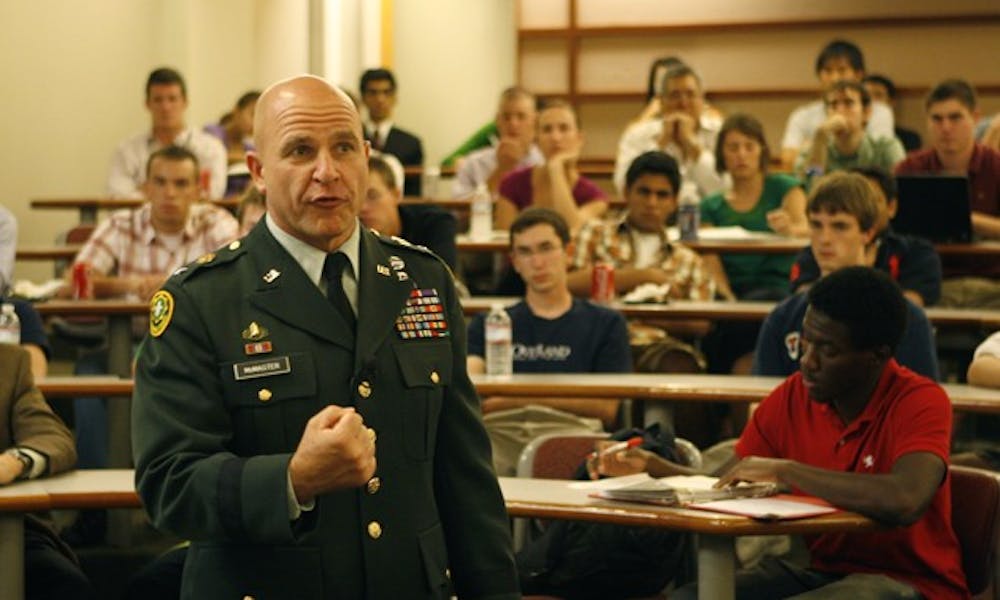On a day when the war in Afghanistan was top news, Duke hosted a high-ranking general in the United States army to speak on “Counterinsurgency and the War in Afghanistan.”
Brig. Gen. H.R. McMaster spoke on the background of U.S. counterinsurgency efforts in Afghanistan and fielded questions from the approximately 100 students and faculty who packed into the Sanford School of Public Policy Monday night.
His speech coincided with the release of the top military commander in Afghanistan’s confidential assessment of the war effort. In the 66-page report, issued to President Barack Obama Aug. 30 but only leaked to the Washington Post late Sunday night, Gen. Stanley McChrystal calls for more troops in order to avoid losing the war.
Because his speech Monday came at a pivotal moment for U.S. policy-making in Afghanistan, McMaster requested that no part of it be recorded for publication. Rather than advocate for any specific policies at a time in which it could be seen as inappropriate for a military officer to do so, he gave a brief background on the conflict in Afghanistan and U.S. counterinsurgency efforts.
In his remarks, which lasted less than 30 minutes, McMaster spoke about the regional difficulties in Afghanistan and Pakistan and their implications for the broader region and the United States. He also laid out the ways in which the Taliban has managed to continually resist U.S. forces and undermine the central government, and how the United States can work to gain local support and fight the insurgency. In the ensuing question-and-answer session, which lasted significantly longer, McMaster spoke on a range of topics including the U.S. relationship with Afghan President Hamid Karzai and the role the NATO and regional U.S. allies will continue to play in the conflict.
“I think it’s important despite all the difficulties associated with the mission in Afghanistan that there are some real opportunities,” McMaster said in an interview. He characterized Al-Qaeda as a “brutal and murderous enemy” and said he believes the U.S. can exploit Al-Qaeda’s lack of popularity and appeal within the Afghan population.
“This is an enemy that’s worth defeating and it’s an enemy that does have some real weaknesses,” he added.
This sentiment echoes the optimistic conclusion to his commander’s summary, in which McChrystal wrote, “While the situation is serious, success is still achievable.”
McMaster was brought to the University as part of a collaboration between the Sanford School of Public Policy’s Duke University Program in American Grand Strategy and the Triangle Institute for Security Studies, an interdisciplinary consortium sponsored by Duke, the University of North Carolina at Chapel Hill and North Carolina State University.
McMaster is known as an intellectual as well as a soldier. In 1998, he wrote “Dereliction of Duty,” a book that criticizes military policy during the Vietnam War. He has served in Iraq twice, first in Operation Desert Storm—for which he was awarded the Silver Star for leadership—and then as commander of the operation to secure the city of Tel Afar in 2005. He has served on U.S. Central Command and helped devise the surge in Iraq as the head of Gen. David Petraeus’ “Council of Colonels.” He is now the director of Concept Development and Experimentation in the Army Capabilities Integration Center.
“General McMaster is one of our country’s most distinguished military officers and one of its deepest thinkers of military strategies,” said Peter Feaver, Alexander F. Hehmeyer professor of political science and director of TISS. He added that “it was a great privilege for us to hear him tonight talk about a very important issue, and a very timely issue.”
McMaster’s speech was met with excitement by many students.
“It was an incredible insight into the mind of a professional who has been on the front lines,” said freshman Carter Suryadevara.
Get The Chronicle straight to your inbox
Signup for our weekly newsletter. Cancel at any time.

